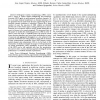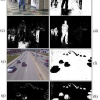766 search results - page 109 / 154 » Gaussian Process Models of Spatial Aggregation Algorithms |
122
Voted
TWC
2008
15 years 2 months ago
2008
Abstract--Orthogonal random beamforming (ORB) constitutes a mean to exploit spatial multiplexing and multi-user diversity (MUD) gains in multi-antenna broadcast channels. To do so,...
136
click to vote
GECCO
2007
Springer
15 years 8 months ago
2007
Springer
Surrogate-Assisted Memetic Algorithm(SAMA) is a hybrid evolutionary algorithm, particularly a memetic algorithm that employs surrogate models in the optimization search. Since mos...
151
click to vote
3DOR
2008
15 years 4 months ago
2008
Mesh analysis and clustering have became important issues in order to improve the efficiency of common processing operations like compression, watermarking or simplification. In t...
129
click to vote
CVPR
2008
IEEE
16 years 4 months ago
2008
IEEE
In background subtraction, cast shadows induce silhouette distortions and object fusions hindering performance of high level algorithms in scene monitoring. We introduce a nonpara...
113
click to vote
GECCO
2007
Springer
15 years 8 months ago
2007
Springer
In this paper we propose a genetic programming approach to learning stochastic models with unsymmetrical noise distributions. Most learning algorithms try to learn from noisy data...


